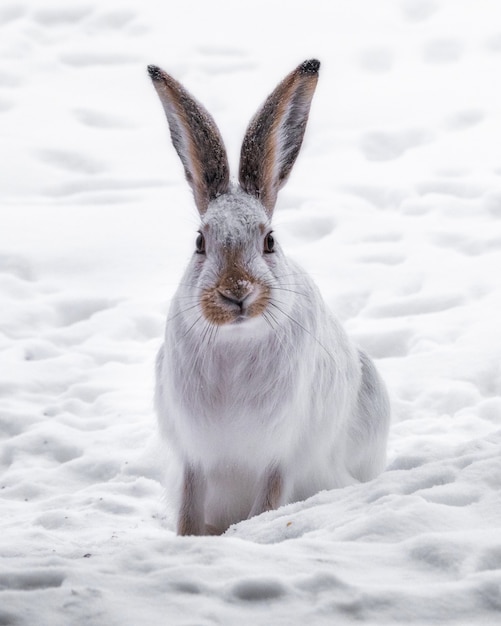Interesting Facts About the Arctic Hare

The Arctic hare is native to the Arctic tundra regions.
Arctic hares have a white fur coat that helps them blend in with the snowy environment.
They have long hind legs that allow them to hop and run quickly.
Despite the extreme cold, Arctic hares do not hibernate.
These hares can withstand temperatures as low as -50 degrees Celsius.
Arctic hares often dig burrows in the snow for shelter.
They have big, round eyes that help them scan for predators.
The Arctic hare’s diet mainly consists of grasses, willows, and small shrubs.
They have sharp teeth that allow them to easily chew through tough vegetation.
During the summer months, Arctic hares molt and change their fur color to a browner shade.
Arctic hares can reach speeds of up to 60 kilometers per hour.
These hares are excellent jumpers and can leap up to 6 meters in a single bound.
The Arctic hare’s fur is densely packed to provide insulation in the freezing temperatures.
They have relatively short ears compared to other hare species.
Arctic hares have keen hearing, which helps them detect any approaching predators.
They are known for their ability to survive in some of the harshest environments on Earth.
While they primarily inhabit the Arctic, they have also been spotted in mountainous regions.
Arctic hares have a relatively long lifespan of 6-7 years in the wild.
They are known to exhibit a behavior called buck jumping where they leap into the air.
Interesting Facts About the Arctic Hare part 2
Despite their small size, Arctic hares have incredible agility and can navigate rocky terrains.
These hares have been observed to form loose social groups during certain times of the year.
Arctic hares have few natural predators due to their excellent camouflage and ability to flee quickly.
Their predators include Arctic foxes, wolves, and birds of prey.
The fur of Arctic hares is highly valued for its warmth and is often used for making clothing.
The population of Arctic hares is stable, but they are still considered a species of least concern.
Arctic hares have a natural adaptation called frost feet that prevents the buildup of ice on their feet.
Their fur changes color to provide better camouflage in different seasons.
Arctic hares have been observed to engage in playful behavior, such as chasing each other.
They are most active during the dusk and dawn hours, known as crepuscular activity.
Arctic hares are excellent swimmers and are able to navigate icy waters.
It is believed that their fur coloration may help regulate body temperature by absorbing or reflecting sunlight.
Arctic hares have adapted to a low-nutrient diet by having a longer digestive system.
They have an acute sense of smell, allowing them to locate food sources buried under the snow.
Arctic hares are not territorial and do not defend a specific area.
They have been observed digging through the snow to find hidden vegetation.
Arctic hares are capable of making a variety of vocalizations, including growls and squeals.
They have been known to eat their own feces to extract any remaining nutrients.
Arctic hares are incredibly nimble and can change direction quickly to evade predators.
Their fur contains both guard hairs and insulating underfur to provide maximum protection against the cold.
Arctic hares typically have a solitary lifestyle but may gather in large numbers during mating season.
They are able to mate within a few weeks after giving birth to a litter, leading to multiple litters in a single year.
Arctic hares have excellent peripheral vision, allowing them to spot predators approaching from any direction.
They have large, powerful hind legs that help them propel themselves through the snow.
These hares are known to exhibit curious behavior, often approaching and investigating new objects in their environment.
Arctic hares play an important role in their ecosystem by acting as prey for larger predators, helping to maintain population balance.

